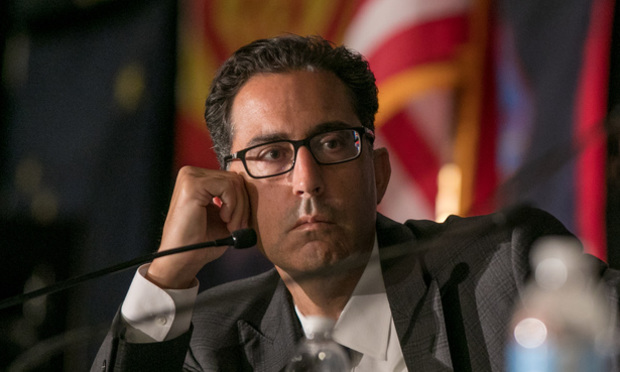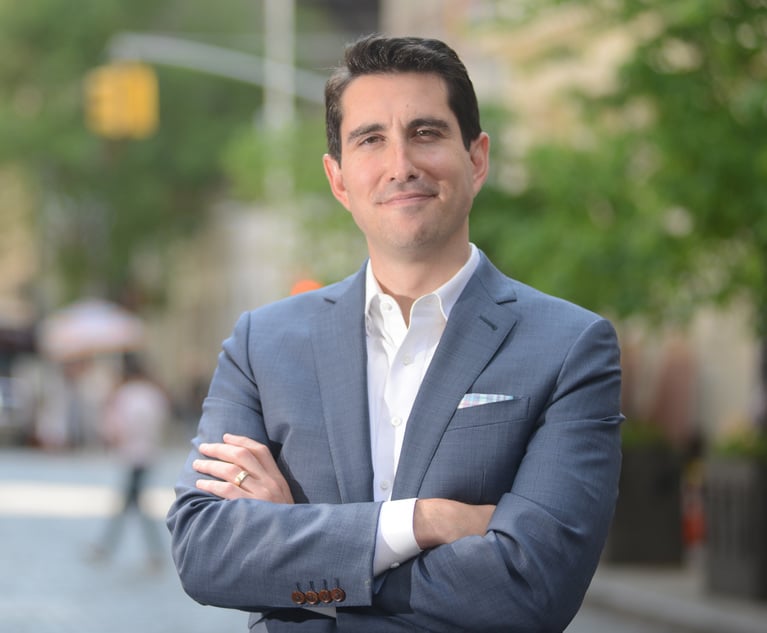'No Heroes in the Story of This Case': Judge Turns Back Bid for Injunction Against Lyft
In an order Tuesday, U.S. District Judge Vince Chhabria lamented plaintiffs' "tone-deaf" arguments and how companies including Lyft are "thumbing their noses at the California Legislature."
April 07, 2020 at 05:49 PM
3 minute read
 U.S. District Judge Vince Chhabria, Northern District of California. Photo: Jason Doiy/ALM
U.S. District Judge Vince Chhabria, Northern District of California. Photo: Jason Doiy/ALMA federal judge denied an emergency motion for a preliminary injunction on behalf of Lyft drivers asking the court to reclassify them as employees to qualify for California's emergency sick leave.
In an order chastising both plaintiffs and the ridesharing company, U.S. District Judge Vince Chhabria of the Northern District of California on Tuesday affirmed his tentative ruling issued prior to a hearing last week finding the question of whether Lyft drivers should qualify for California sick pay is less of an emergency than the plaintiffs' counsel at Lichten & Liss-Riordan suggested.
Chhabria granted Lyft's motion to compel arbitration on plaintiffs' claims for individualized relief, struck the class allegations and remanded the public injunction to the San Francisco Superior Court.
The judge said that the injunction motion crumbles since California's limited three-day paid sick leave would face drivers with the possibility of losing "thousands of dollars" of federal coronavirus relief if they were reclassified as employees under state law.
In the ruling, the judge also pointed to a Lyft driver's declaration, which noted he would continue driving "fever or no fever" to feed his children.
"The upshot of his position, then, is as follows: He currently has little chance of making more than a few dollars a week by giving a ride or two, but if he has an opportunity to make those few dollars, he will not allow coronavirus symptoms to prevent him from doing so, even at risk of killing his passengers, even though that money will be a drop in the bucket compared to the assistance he could get from the emergency legislation, and even though obtaining that drop could shrink the overall size of the bucket," Chhabria wrote.
However, Lyft and its Keker, Van Nest & Peters counsel did not get off the hook in Chhabria's order.
"While there's no justification for the tone-deafness of the position advanced by the plaintiffs and their lawyer as this crisis unfolds, perhaps there's an explanation for how they got here," the judge wrote.
Chhabria noted that firms such as Lichten & Liss Riordan have been working to reclassify Lyft and other gig economy independent contractors as employees for years and have been thwarted by "widespread use of forced arbitration by these companies and by the previous lack of clarity in the law."
Since the passage of Assembly Bill 5, which codified the worker classification test developed in Dynamex Operations West v. Superior Court, Chhabria wrote that Lyft drivers meet the requirements for employee status and the company's arguments to the contrary are "frivolous."
"But rather than comply with a clear legal obligation, companies like Lyft are thumbing their noses at the California Legislature, not to mention the public officials who have primary responsibility for enforcing A.B. 5.," he said.
"In short, there are no heroes in the story of this case."
Read more:
This content has been archived. It is available through our partners, LexisNexis® and Bloomberg Law.
To view this content, please continue to their sites.
Not a Lexis Subscriber?
Subscribe Now
Not a Bloomberg Law Subscriber?
Subscribe Now
NOT FOR REPRINT
© 2025 ALM Global, LLC, All Rights Reserved. Request academic re-use from www.copyright.com. All other uses, submit a request to [email protected]. For more information visit Asset & Logo Licensing.
You Might Like
View All
Patreon Hit With Lawsuit for Allegedly Diverting Subscriber Data to Meta

Kraken’s Chief Legal Officer Exits, Eyes Role in Trump Administration
3 minute read
‘Facebook’s Descent Into Toxic Masculinity’ Prompts Stanford Professor to Drop Meta as Client
6 minute read
Miami Judge Approves Shaq's $11 Million Settlement to Resolve Astrals Investor Claims
3 minute readLaw Firms Mentioned
Trending Stories
- 1'A Death Sentence for TikTok'?: Litigators and Experts Weigh Impact of Potential Ban on Creators and Data Privacy
- 2Bribery Case Against Former Lt. Gov. Brian Benjamin Is Dropped
- 3‘Extremely Disturbing’: AI Firms Face Class Action by ‘Taskers’ Exposed to Traumatic Content
- 4State Appeals Court Revives BraunHagey Lawsuit Alleging $4.2M Unlawful Wire to China
- 5Invoking Trump, AG Bonta Reminds Lawyers of Duties to Noncitizens in Plea Dealing
Who Got The Work
J. Brugh Lower of Gibbons has entered an appearance for industrial equipment supplier Devco Corporation in a pending trademark infringement lawsuit. The suit, accusing the defendant of selling knock-off Graco products, was filed Dec. 18 in New Jersey District Court by Rivkin Radler on behalf of Graco Inc. and Graco Minnesota. The case, assigned to U.S. District Judge Zahid N. Quraishi, is 3:24-cv-11294, Graco Inc. et al v. Devco Corporation.
Who Got The Work
Rebecca Maller-Stein and Kent A. Yalowitz of Arnold & Porter Kaye Scholer have entered their appearances for Hanaco Venture Capital and its executives, Lior Prosor and David Frankel, in a pending securities lawsuit. The action, filed on Dec. 24 in New York Southern District Court by Zell, Aron & Co. on behalf of Goldeneye Advisors, accuses the defendants of negligently and fraudulently managing the plaintiff's $1 million investment. The case, assigned to U.S. District Judge Vernon S. Broderick, is 1:24-cv-09918, Goldeneye Advisors, LLC v. Hanaco Venture Capital, Ltd. et al.
Who Got The Work
Attorneys from A&O Shearman has stepped in as defense counsel for Toronto-Dominion Bank and other defendants in a pending securities class action. The suit, filed Dec. 11 in New York Southern District Court by Bleichmar Fonti & Auld, accuses the defendants of concealing the bank's 'pervasive' deficiencies in regards to its compliance with the Bank Secrecy Act and the quality of its anti-money laundering controls. The case, assigned to U.S. District Judge Arun Subramanian, is 1:24-cv-09445, Gonzalez v. The Toronto-Dominion Bank et al.
Who Got The Work
Crown Castle International, a Pennsylvania company providing shared communications infrastructure, has turned to Luke D. Wolf of Gordon Rees Scully Mansukhani to fend off a pending breach-of-contract lawsuit. The court action, filed Nov. 25 in Michigan Eastern District Court by Hooper Hathaway PC on behalf of The Town Residences LLC, accuses Crown Castle of failing to transfer approximately $30,000 in utility payments from T-Mobile in breach of a roof-top lease and assignment agreement. The case, assigned to U.S. District Judge Susan K. Declercq, is 2:24-cv-13131, The Town Residences LLC v. T-Mobile US, Inc. et al.
Who Got The Work
Wilfred P. Coronato and Daniel M. Schwartz of McCarter & English have stepped in as defense counsel to Electrolux Home Products Inc. in a pending product liability lawsuit. The court action, filed Nov. 26 in New York Eastern District Court by Poulos Lopiccolo PC and Nagel Rice LLP on behalf of David Stern, alleges that the defendant's refrigerators’ drawers and shelving repeatedly break and fall apart within months after purchase. The case, assigned to U.S. District Judge Joan M. Azrack, is 2:24-cv-08204, Stern v. Electrolux Home Products, Inc.
Featured Firms
Law Offices of Gary Martin Hays & Associates, P.C.
(470) 294-1674
Law Offices of Mark E. Salomone
(857) 444-6468
Smith & Hassler
(713) 739-1250






